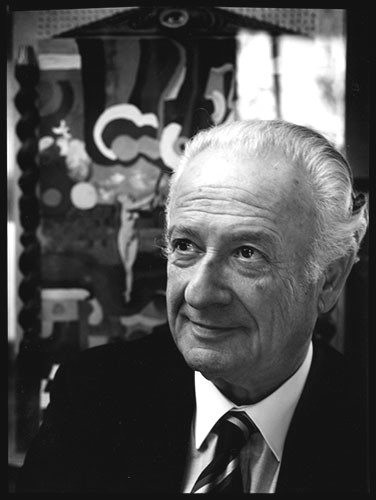
Wladimir Alexandrovich GRANOFF (7. 09. 1924, Strasbourg — 2. 02. 2000, Paris) — French psychoanalyst of Russian origin, disciple and colleague of Jacques Lacan. He was born in the family of Russian émigrés; and although he wrote many of his books in French, Russian was his first language. 'My first language is Russian, my second languages are French and German, and lastly English. When I want to use offensive words or count I do it in English, when I am planning I speak Russian, if I am lecturing I use French, and when I am singing the songs of my childhood, they are in German' (In Memoriam of Jacques Lacan.) After World War II he went to Paris, where he received a degree in Psychiatry. In the 1950s he met Lacan and visited his seminars in the St Anna Clinic. Serge Leclaire and Francios Perrier and Granoff were the most active members of the Lacanian cycle in those years. But in 1964 after a quarrel with Lacan he initiated the expulsion of his teacher and colleague from the French Psychoanalytic Society.Nevertheless, he remains Lacan's disciple in reading Freud and developed Lacan's ideas in many of his works on psychoanalysis. He became well-known with his articles on feminine sexuality. This theme seems to be central both to psychoanalysis and for contemporary philosophy. Freud died before he was able to fully grasp the nature of female desire. Catherine Clement witnesses that Lacan always interested in feminine sexuality and eventually resolves that problem in his famous sentence 'La femme n'existe pas'. Granoff began his own research with the analysis of filiations, i.e. varieties of kinship. Unlike Levi-Strauss he is interested in the elementary structure of kinship, but also in the geneaology of psychoanalysis, where Freud was recognized as a father and all his disciples known to be sons, who sought to overcome the doctrine of their teacher.
Granoff devoted his next three books to the theme of feminine sexuality. 'A woman can not be conquered: she is possessed and, moreover, according to her own invitation, which was especially covered' (Filiation, p. 45). In a Freudian manner, Granoff considers that a woman wants to be an object of sexual desire, because she is included into symbolic order as the one who has no phallus. Therefore she depends on male desire and wants to satisfy him.
The third key theme of Granoff research is the desire of the analyst. He follows Lacan's distinction between sexual drive and drive to the truth and associates psychoanalysis with translation from the forgotten language of the unconscious. That is why the analyst, like an interpreter, should not aspire for obvious understanding, but should want to learn the truth. Granoff himself speaks many languages and comprehended that any translation is conventional, therefore objective language is not a guarantee of correctness. Cosmopolitanism and multilinguism were the credo of Granoff: 'For me internationalism is a kind of passport to psychoanalysis' (In Memoriam of Jacques Lacan).
He remains in the history of psychoanalysis as the first Russian-speaking disciple of Lacan and a brilliant psychoanalyst, who remaind Freudian until his death. He agrees with Lacan that Freud's discourse is endless therefore it is seems to be dangerous both for analysts and analysants. Paradoxically, Granoff is almost unknown in Russia, because the work of translation of an author's books into his native language begins only after his death.
-=-
Lacan J., Granoff W. Perversion. Psychodynamics and Therapy. in Random House, 1956;
Granoff W. Filiations. L'avenir du complexe d'Oedipe. Paris: Les Editions de Minuit, 1975;
Granoff W. La pense et la feminin. Paris: Les Editions de Minuit, 1976;
Granoff W., Perrier F. Le désir et le féminin. Paris: Aubier, 1979;
Granoff W., Ray J.-M. L'occulte, objet de la pense freudienne. Paris: P.U.F., 1983;
Granoff W., Ray J.-M. Le transfert de pensee. Aubier, 2001;
Granoff W., Lavi J.-C. Lacan, Ferenczi et Freud. Paris: Gallimard, 2001;
Granoff W. Le désir d'analyse. Paris: Flammarion, 2004;
Granoff W. Destins de la bisexualite. Paris: Etudes Freudiennes, 2005;
Granoff W. 'Propos sur Jacques Lacan Le fit russe'. in L'Infini, No. 58, 1997;
-=-
© Dmitry A. Olshansky, M.A. in Philosophy (St. Petersburg)
E-mail: olshansky@hotmail.com
